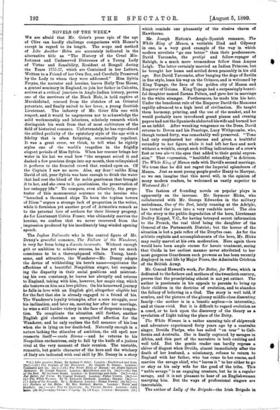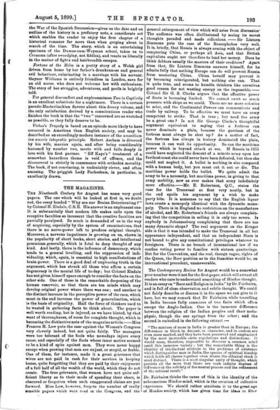NOVELS OF THE WEEK.* WE are afraid that Mr. Grier's
prose epic of the age of Clive can hardly challenge comparisons with Homer's except in regard to its length. The scope and method of Like Another ' Helen are accurately indicated in the alternative title as "The History of the Cruel Mis- fortunes and Undeserved Distresses of a Young Lady of Virtue and Sensibility, Resident at Bengali during the Years 1755.57, which are Contained in her Letters, Written to a Friend of her Own Sex, and Carefully Preserved by the Lady to whom they were addressed." Miss Sylvia Freyne, the narrator and heroine, leaves Holly Tree House, a genteel seminary in England, to join her father in Calcutta, arrives at a critical juncture in Anglo-Indian history, proves one of the survivors of the Black Hole, is held captive at Murshidabad, rescued from the clutches of an Oriental potentate, and finally united to her lover, a young Scottish Lieutenant. The industry of Mr. Grier fills one with respect, and it would be ungenerous not to acknowledge the solid workmanship and laborious, scholarly research which distinguish his work from that of most cultivators of the field of historical romance. Unfortunately, he has reproduced the stilted prolixity of the epistolary style of the age with a fidelity that is often fatiguing, occasionally repellent. It was a great error, we think, to tell what be rightly styles one of the world's tragedies in the frigidly elegant periods of Miss Sylvia. When her rescuer brings her water in his hat we read how "the sergeant seized it and dashed a few precious drops into my mouth, then relinquished it perforce to the frenzied crowd that rushed upon us. Of the Captain I saw no more. Alas, my dear ! unlike King David of old, your Sylvia was base enough to drink the water that had cost the blood of the noble gentleman that brought it to her, and she owes to it, questionless, the preservation of her unhappy life." To compare, even allusively, the perpe- trator of this monumental sentence to the heroine who "launched a thousand ships To barn the topless towers of Ilium" argues a strange lack of proportion in the writer, while it furnishes yet another proof of Aristotle's remark as to the paternal love of authors for their literary progeny. As for Lieutenant Colvin Fraser, who ultimately marries the heroine, we confess that we never recovered from the impression produced by his inordinately long-winded opening speech.
The Inglese Italianato who is the central figure of Mr. Denny's graceful romance, The Failure of the Wanderer, is very far from being a diavolo incarnate. Without enough grit or ambition to achieve success, he has yet too much conscience to be a thoroughpaced villain. Young, hand- some, and attractive, the Wanderer—Mr. Denny adopts the device of withholding his hero's name—captivates the affections of a beautiful Neapolitan singer, but recognis- ing the disparity in their social positions and mistrust. ing his own constancy, he leaves her abruptly and returns to England, taking with him, however, her magic ring, which she bestows on him as a love philtre. On his homeward journey he falls in love with an English girl, altogether eligible but for the fact that she is already engaged to a friend of his. The Wanderer's loyalty triumphs, after a sore struggle, over his inclination, and later on, meeting her after her marriage, he wins a still harder victory in the face of desperate tempta- tion. To complicate the situation still farther, another English girl cherishes an unrequited affection for the Wanderer, and he only realises the full measure of his loss when she is lying on her death-bed. Naturally enough in a nature lacking the stimulus of ambition, the old spell now reasserts itself — canta Sirena — and he returns to his Neapolitan enchantress, only to fall by the knife of a jealous rival at the very moment of their reunion. The unstable, romantic, but gentle character of the hero and the witchery of Italy are indicated with real skill by Mr. Denny in a story
• (1.) Like Another Helen. By Sydney C. Grier. London : Blackwood and Sons. [8s.]—(2.) The Failure of the Wanderer. By Charles E. Denny. Loudon : Constable and Co. [Cs.]—(3.) The White King of Manoa: an Anglo-Spanish Romance. Be Joseph Hatton. London : Mutchinson and Co. [6s.]—(4.) One of the Best. By Seymour Hicks. London : G. Routledge and Sons. (6s.)—(5.) For Better, for Worse. By Conrad Howard. London : Fisher Unwiu. [6s.]- (8.) The White Woman. Be W. Edwards Tirebuck. London : Harper. [6s.)— ( 7.) Lally of the Brigade. by L. McManus. London : Fisher Unwln. (2,. 6d.1— Is.) Fortune at the Helm. By Mrs. Herbert Martin. Loudon : Hurst and Blackett. [es.]—(9.) Two to Captwity. By Vincent Brown. London : John lose. Ds. sa.3--(iu.) Virtue's Trusiedy. By Ed Kaye. London : Macqueen. [Gs.)
which reminds one pleasantly of the elusive charm of Hawthorne.
Mr. Joseph Hatton's Anglo-Spanish romance, The White King of Manoa, a veritable Iliad and Odyssey in one, is a very good example of the way in which modern novelists "go one better" than their predecessors. David Yarcombe, the protégé and fellow-voyager of Raleigh, is a much more tremendous fellow than Amyas Leigh. The latter certainly married an Indian Princess, but he brought her home and settled down peaceably in his old age. But David Yarcombe, after banging the dogs of Seville in fine style, loses his way on the Orinoco, and is welcomed by King Topago, the Inca of the golden city of Manoa and Emperor of Guiana. King Topago had a surpassingly beauti- ful daughter named Zarana Peluca, and gave her in marriage to the *bite stranger. Furthermore, he made him his heir. Under the beneficent rule of the Emperor David the Manoans rapidly advanced to a high level of civilisation. He taught them harmony, printing, and the use of the musket, and he would probably have introduced grand pianos and evening papers had not the Spaniards abducted his wife and burned her as an infidel. After wreaking vengeance on the Dons, David returns to Devon and his Penelope, Lucy Withycombe, who, though turned forty, was remarkably well preserved. " Time had only emphasised her charms and given a healthful rotundity to her figure, while it had left her face and neck without a wrinkle, except such trifling indications of a crow's foot or two ataait the eyes that added to their genial expres- sion." That expression, "healthful rotundity," is delicious. The White King of Manoa ends with David's second marriage. We trust that he did not regret the Imperial splendours of Manoa. Just as most young people prefer Henty to Marryat, so we can imagine that this novel will, in the opinion of many modern readers, be welcomed as vastly superior to Westward Ho !
The fashion of founding novels on popular plays is apparently on the increase. Mr. Seymour Hicks, who collaborated with Mr. George Edwardes in the military melodrama, One of the Best, lately running at the Adelphi, has turned the piece into a very readable novel. The don of the story is the public degradation of the hero, Lieutenant Dudley Keppel, V.C., for having betrayed secret information to the French, the real thief being the daughter of the General of the Portsmouth District; but the horror of the situation is but a pale reflex of the Dreyfus case. As for the athletic exploits and accomplishments of the hero, Mr. Hicks may really marvel at his own moderation. Here again there would have been ample excuse for heroic treatment, seeing that Ouida in her earliest manner never attributed to her most gorgeous Guardsmen such prowess as has been recently displayed in real life by Major Poore, the Admirable Crichton of the British Army.
Mr. Conrad Howard's work, For Better, for Worse, which is dedicated to the fathers and mothers of the twentieth century, proves that the proselytising atheist is not yet extinct. The author is passionate in his appeals to parents to bring up their children in the doctrine of evolution, and to abandon the fallacy of believing in a God. The story is well told, if sombre, and the picture of the gloomy middle-class dissenting family—the mother is in a lunatic asylum—is interesting, and at times vivid. But it is difficult to regard evolution as a creed, or to look upon the discovery of the theory as a revelation of Light taking the place of the Deity.
The White Woman is a rather amusing tale of shipwreck and adventure experienced forty years ago by a contralto singer, Druida Phelps, who has sailed " on tour " to Cali- fornia and Australia. She is finally captured by savages in Africa, and this part of the narrative is both exciting and well told. But the gentle reader can hardly repress a shiver of disgust when Druida, almost immediately after the death of her husband, a missionary, refuses to return to England with her father, who has come to her rescue, and marries the savage chief, who "leaves it" to her either to go or stay as his only wife for the good of the tribe. This " noble savage " is an engaging creature, but he is a regular savage, and it is not pleasant to hear of an Englishwoman marrying him. But the ways of professional singers are inscrutable.
The author of Lally of the Brigade—the Irish Brigade in
the War of the Spanish Succession—gives us the date and an outline of the history in a prefatory note, a considerate act which enables the reader to enjoy the first chapter of a historical romance far more than when groping about in search of the time. The story, which is an entertaining specimen of the Dumas-cum-Weyman school, takes us to Cremona (after swordplay, not fiddles), and treats us liberally in the matter of fights and hairbreadth escapes.
Fortune at the Helm is a pretty story of a Welsh girl driven from home by her father's drunkenness and general evil behaviour, culminating in a marriage with his servant. Gaynor Williams is entirely friendless in London, save for an old nurse. who does not welcome her with enthusiasm. The story of her struggles, adventures, and perils is brightly told.
For general discomfort and unpleasantness Two in Captivity is an excellent substitute for a nightmare. There is a certain pseudo-Maeterlinckian flavour about this dreary volume, and the only satisfaction derived by a conscientious reader who finishes the book is that the "two " concerned are as wretched as possible, as they fully deserve to be.
Virtue's Tragedy is based on an episode more likely to have occurred in American than English society, and may be described as an exceedingly modern instance of the amantium irx amoris integratio principle. Robert Ascham is divorced by his wife, marries again, and after being considerably harassed by number two, meets with and falls deeply in love with his first partner. " Eff Kaye's " treatment of a somewhat hazardous theme is void of offence, and the denouement is strictly in consonance with orthodox morality. The book, if not convincing, is undeniably clever, and often amusing. The priggish Lady Pachesham, in particular, is excellently drawn.



































 Previous page
Previous page